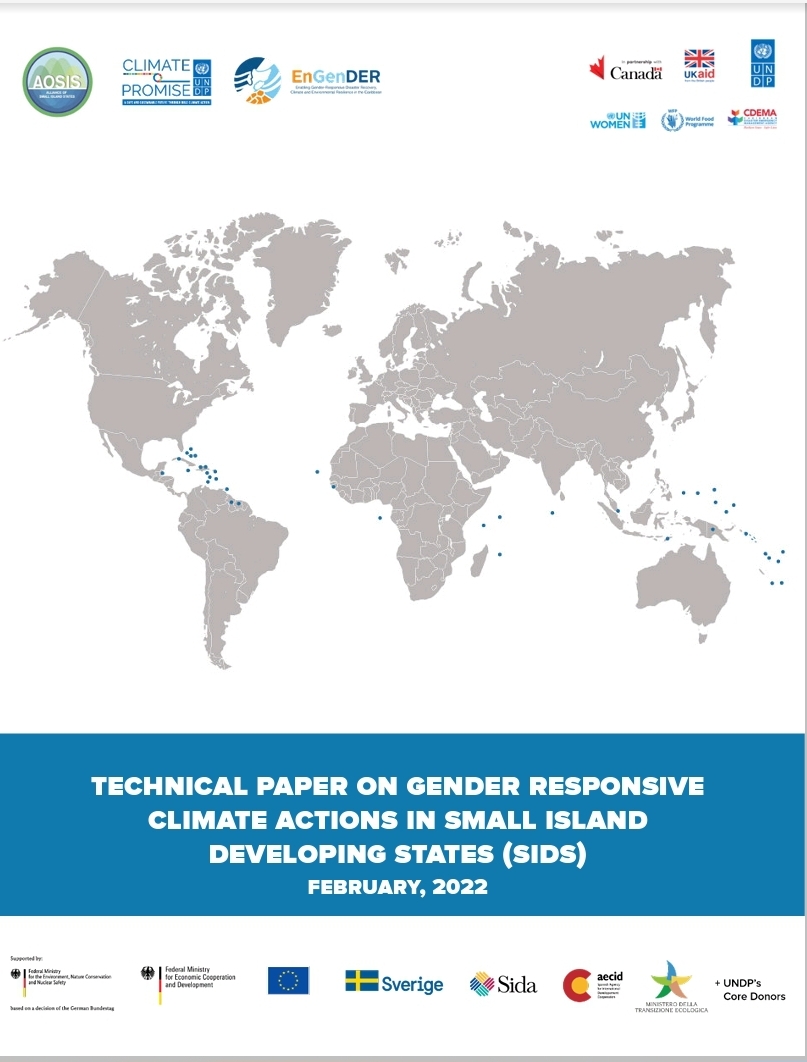DOCUMENT
Gender Responsive Climate Actions in Small Island Developing States (SIDS)
2022-02-01 UNDP, AOSIS Download PDFTopic: Climate

Introduction: Small Island Developing States (SIDS) have supported and continue to support climate actions that promote gender equality and the empowerment of women and vulnerable groups. Governments and civil society actors with support from international organizations have strengthened their national policies and institutional mechanisms, planned gender responsive climate change actions, and enhanced national-level capacities to incorporate gender equality considerations. These countries have also developed climate change and gender action plans, gender responsive Nationally Determined Contributions (NDCs), and National Adaptation Plans (NAPs). They also support gender responsive programmes related to climate-smart agriculture and energy projects. The objective of the paper is to highlight examples of gender responsive climate actions implemented by Small Island Developing States (SIDS) that contribute to the achievement of the country’s climate goals and commitments, as well as the implementation of the Paris Agreement and the Enhanced Lima Work Programme on Gender and its Gender Action Plan. Special attention is given to the role of gender considerations in enhanced NDCs, or examples of SIDS with gender responsive actions already included in their first or updated NDCs, all of which inform the analysis. The paper focuses on and highlights how countries are moving from policy to action and provides a comprehensive analysis of the enabling conditions required to implement gender responsive climate mitigation and adaptation actions on the ground. In this context, the paper identifies best practices in SIDS across regions that showcase national actions to ensure the development and implementation of gender responsive climate policies and strategies. It is expected that the case studies featured in this technical paper will inform and inspire countries in other regions to implement gender responsive climate change actions. The case studies were identified through a call for country experiences issued by The Alliance of Small Island States (AOSIS) and the United Nations Development Programme (UNDP). Virtual interviews with key stakeholders in the Caribbean, African, and Asia-Pacific regions complemented this call. In addition, information was obtained through a web-based scoping study followed by a desk review. The paper includes two types of examples and good practices on: 1. How countries have strengthened the enabling conditions related to governance, planning, and policy required to implement gender responsive actions on the ground and 2. How countries have implemented gender responsive actions across specific sectors related to mitigation and adaptation. The selection of the case study examples was based on the following criteria: 1. Transformational impact: The case study contributed to significant, sustainable, and sustained change at the policy, programme and/or institutional level. 2. Synergy with the Sustainable Development Goals: The case study contributed to the fulfilment of one or more Sustainable Development Goals of the 2030 Agenda. 3. Contribution to the implementation of the Lima Work Programme on Gender and its Gender Action Plan. 4. National or subnational impact: Development impact at regional or national level clearly demonstrates gender responsive impacts. 5. Replicable approaches: Case study examples which demonstrate unique gender responsive elements in climate change actions that can be replicated or upscaled. Document continues. Download the PDF to read the full version
Sub Topic: Cross-cutting
Forum: None
Meeting:
____________________________